Behind The Scenes: Discover What Makes Rank Me’s Sentiment Analysis Algorithm One Of The Best In Business!
Sentiment analysis allows you to understand the exact sentiment by analyzing the emotional tone behind a qualitative statement made by your audience. It allows you to find all the statements/mentions segregated as positive, negative or neutral all under one platform. Recently, sarcasm detector has been integrated into the tool making our sentiment analysis to stand out.
Our API with natural language processing (NLP) gives you instant and accurate results within seconds when it is challenging for a majority of tools to accurately evaluate what truly is a negative, neutral or a positive statement.
Now, allow me to explain to you how does Rank Me Online’s sentiment analysis text analyzer actually work-
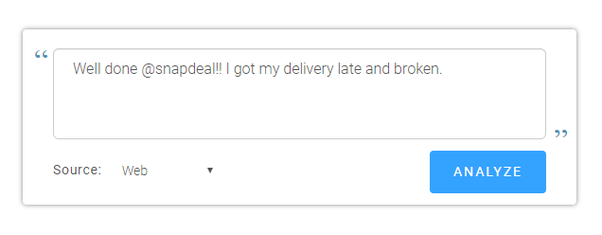
Here, the review given by a customer on a review platform after receiving a delivery of the ordered product states-
“Well done @snapdeal!! I got my delivery late and broken”, which means that the delivery for the product was delayed and above that, it was also broken. However, the exact meaning of the word “broken” cannot be determined as it might mean the protective seal being broken or the product is broken. What we can clearly figure out is that the product delivered was not intact in the way it was supposed to be.

Now, the occurrence of the words “well done” in the statement does not mean that the statement is a positive one, as it was said in a sarcastic way! Here, our tool‘s natural language processing comes into effect, determining the emotional tone behind the statement and segregates it as positive, negative or neutral. However, this particular statement comes out to be a negative one.
It is a known phenomenon that sentiment analysis is evolving with time and technology. At the moment text analysis is not capable of measuring and analyzing skepticism, hope, anxiety, excitement of a given statement, but as it’s evolving in a continuous manner this particular technology will be made available very soon. Even you cannot deny the fact that sentiment analysis is a continuously growing research area and all the existing models and algorithms do not carry more than 90 per cent accuracy. However, over several tests, our algorithm gave an accuracy of 80-85 per cent.
What will you get by using Rank Me Online’s Sentiment Analyzer Tool?
Identifies Misspelled Words & Grammatical Errors
Our AI-powered algorithm efficiently identifies incorrect words and grammatical errors. After identifying, the misspelt words are replaced in the text by their most probable replacements before decoding the emotional tone, giving you the exact sentiment of that particular statement or mention.
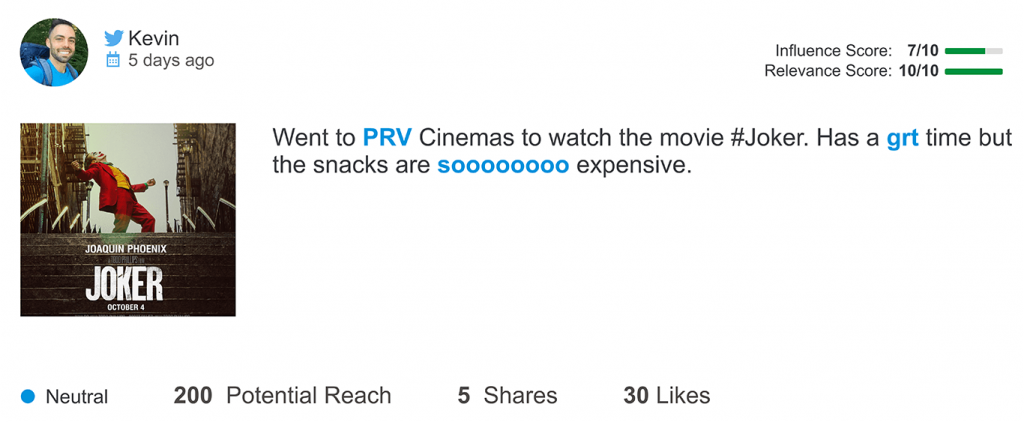
Here, the image shows Kevin tweeting-
“Went to PRV Cinemas to watch the movie #Joker. Has a grt time but the snacks are soooooooo expensive”.
This particular tweet has a grammatical error “Has”, which should be “Had” and other wrongly written words such as “grt” that should “great” and “soooooooo” that should be just “so”. Taking into account all these errors, rectifying it and giving you the exact sentiment is what our algorithm is best at. However, this particular tweet comes out to be neutral.
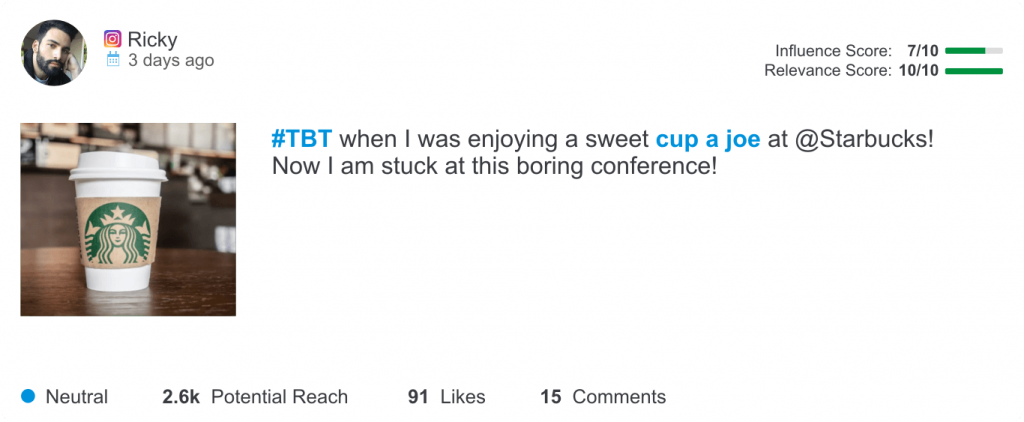
Identifies Slangs
Being informal in nature, slangs are most commonly used in conversations, especially over social media. Not being able to identify slangs may result in misinterpretation of statement and incorrect identification of sentiment. But, with Rank Me Online, there is nothing to worry as our database contains all the slang words, with their meanings and their weights. If a slang word is found in the database, it is replaced by its English meaning, giving you the accurate sentiment of any particular statement.
Here, as you can see in the image that our algorithm clearly identifies the slangs “#TBT” and “cup a joe”, deriving the exact tone behind the statement, which is ultimately neutral.
Understands the Actual Context of the Statement
Without understanding the actual context of any statement, analyzing and determining its sentiment is kind of vague.
To have a better understanding, let’s take the example of a review given by a customer on a review platform after visiting a restaurant. It states that-
“Burritos are good but the ambience is not that good!!”



From this particular review, it can be clearly understood that the quality of burritos was satisfying for the customer but the ambience was not good at all. Now, the occurrence of the word “good” two times in the statement does not mean that the review is on your favour. As the review says, “Burritos are good”- which is positive and “ambience is not that good”– which is negative in nature, here, our natural language processing comes into effect determines the statement as neutral.
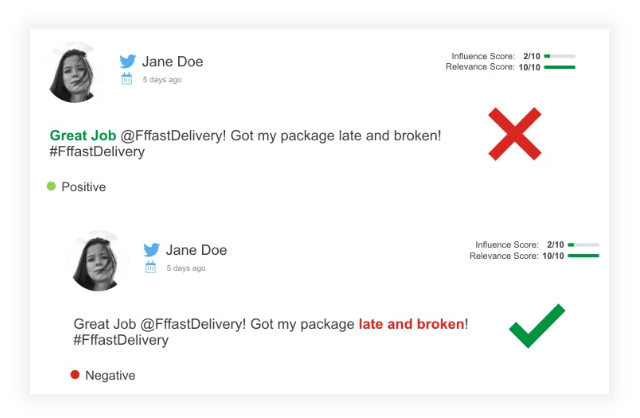
Identifies Sarcasm
Sarcasm is a sharp, bitter expression or remark that is mainly differentiated by the inflection with which it is spoken and is largely context-dependent. Unable to identify sarcasm in a statement can result in an inaccurate determination of sentiment. Our AI-powered algorithm accurately identifies sarcasm and gives you the exact sentiment behind any statement.
As we can see in the tweet, frustrated with the service of @FffastDelivery, Jane Doe tweeted
“Great Job @FffastDelivery! Got my package late and broken!”
Now, taking into account “Great Job” & ignoring “late and broken” will give you a positive sentiment which is fairly inaccurate. However, going the other way round will give you the exact accurate sentiment i.e negative, which is what our sentiment analyzer tool is capable of delivering.
Analyzes Emojis
Emojis are one of the most useful forms of shorthand communication in the present-day digital world. Emojis gives you a quick overview of consumers’ perceptions of your brand, helping you in understanding the actual emotion behind the text posted by your audience. Additionally, it also helps you in understanding how men and women use different emojis to express their feelings, giving you a clear idea about how your customer segment behaves on different social platforms.
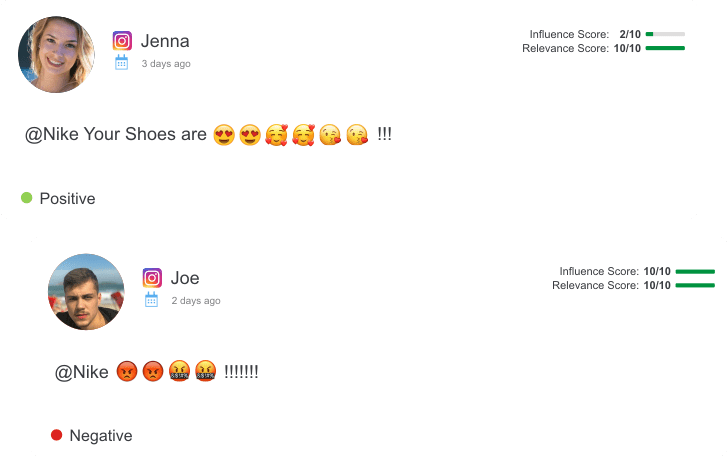
It’s wide usage across social media and the web validates the significance of emojis while determining the sentiment of any given statement. If you are doing sentiment, you cannot ignore emojis at all! Having known the significance of emojis in sentiment analysis, we have integrated an extensive list of emojis to our database, based on which you get the exact sentiment behind any given statement.
Different Algorithm For Social Media and the Web
Taking into account various factors like the use of hashtags, emojis and wide usage of short forms over various social media platforms, we have developed separate algorithms for social media and other non-social media sources such as review sites, blogs, articles, forums etc. Doing this has resulted in increased efficiency and higher accuracy in analyzing mentions and deriving the exact sentiment out of any given statement.

